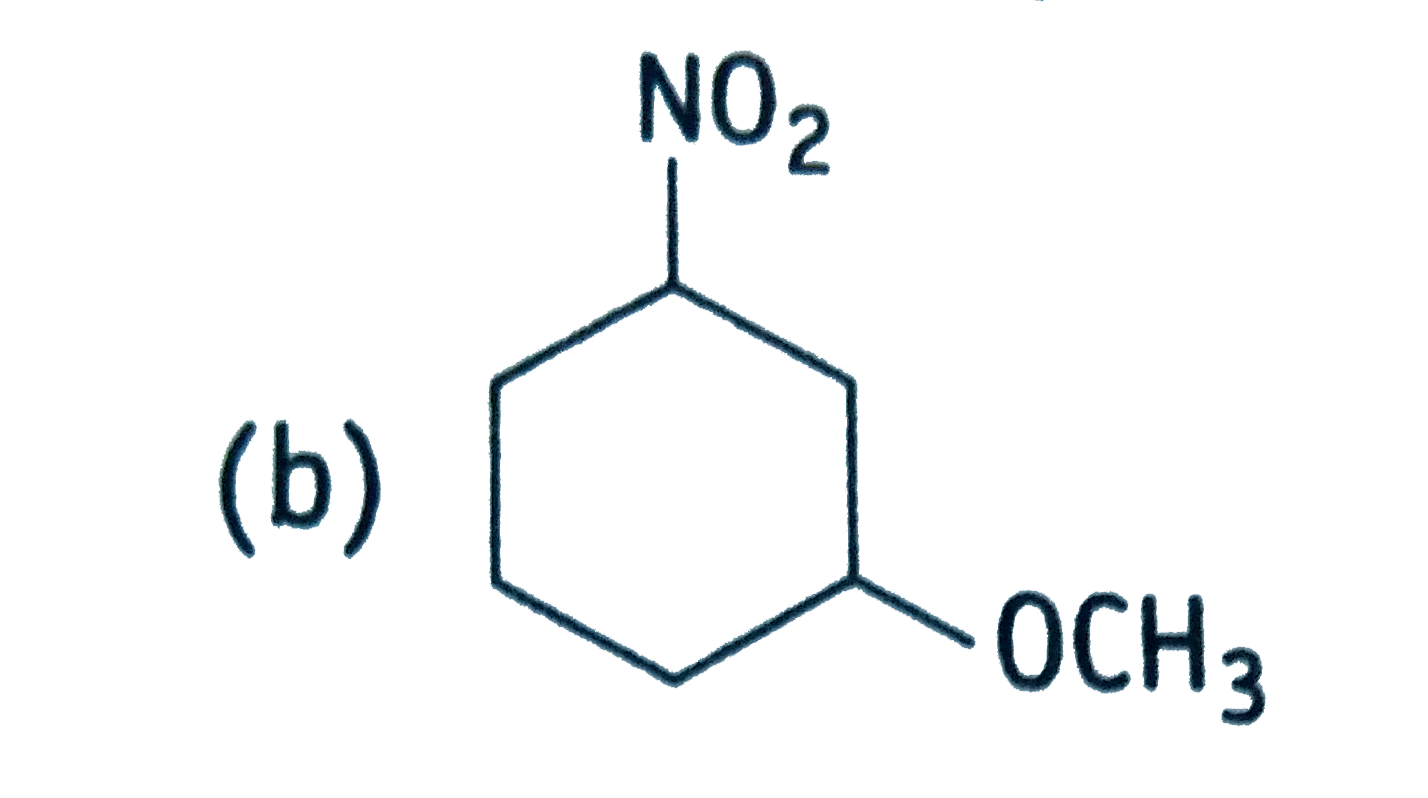Complete Solutions to NCERT (EXAMPLAR PROBLEMS) (Short Answer Type Questions) of chapter ALCOHOLS, PHENOLS AND ETHERS of Class 12 book with complete answers and questions
| Class 12 | CHEMISTRY |
| Chapter | ALCOHOLS, PHENOLS AND ETHERS |
| MODERN PUBLICATION | NCERT (EXAMPLAR PROBLEMS) (Short Answer Type Questions) |
| Number Of Questions | 35 |
| Academic Year | 2023-24 |
What is the structure and IUPAC name of glycerol?
View SolutionWrite the IUPAC name of the following compounds.
(a) `CH_(3)-underset(CH_(3))underset(|)(CH)-underset(OH)underset(|)(CH)-underset(C_(2)H_(5))underset(|)(CH)-underset(OH)underset(|)(CH)-CH_(3)`
(b)
View SolutionWrite the IUPAC name of the compound given below.
`CH_(3)-CH_(2)-underset(CH_(3))underset(|)(C)=underset(CH_(2)OH)underset(|)(C)-OH`
View SolutionName the factors responsible for the solubility of alcohols in water.
View SolutionWhat is denatured alcohol ?
View SolutionSuggest a reagent for the following conversion.

View SolutionOut of 2-chloroethanol and ethanol which is more acidic and why ?
View SolutionSuggest a reagent for conversion of ethanol to ethanal.
View SolutionSuggest a reagent for conversion of ethanol to ethanoic acid.
View SolutionOut of o-nitrophenol and p-nitrophenol, which is more volatile ? Explain?
View SolutionOut of o-nitrophenol and o-cresol which is more acidic ?
View SolutionWhen phenol is treated with bromine water, white precipitate is obtained. Give the structure and the name of the compound formed.
View SolutionArrange the given compounds in decreasing order of acidity and give a suitable explanation, Phenol, o-nitrophenol, o-cresol
View SolutionAlcohols react with active metals e.g., Na, K etc., to give corresponding alkoxides. Write down the decreasing order of reactivity of sodium metal towards primary, secondary and tertiary alcohols.
View SolutionWhat happens when benzene diazonium chloride is heated with water ?
View SolutionArrange the following compounds in decreasing order of acidity.
`H_(2)O, ROH, HC -= CH`
View SolutionName the enzymes and write the reactions involved in the preparation of ethanol from sucrose by fermentation.
View SolutionHow can propan-2-one be converted into tert-butyl alcohol ?
View SolutionWrite the structures of the isomers of alcohols with molecular formula `C_(4)H_(10)O` Which of these exhibits optical acitvity ?
View SolutionExplain why is OH group in phenols more strongly held as compared to OH group in alcohols ?
View SolutionExplain why nucleophilic substitution reactions are not very common in phenols.
View SolutionPreparation of alcohols from alkenes involves the electrophilic attack on alkene carbon atom. Explain its mechanism.
View SolutionExplain why is O=C=O non polar while R-O-R is polar ?
View SolutionWhy is the reactivity of all the three classes of alcohols with conc. HCl and `ZnCl_(2)` (Lucas reagent) different ?
View SolutionWrite steps to carry out the conversion of phenol to aspirin.
View SolutionNitration is an example of aromatic electrophilic substitution and its rate depends upon the group already present in the benzene ring. Out of benzene and phenol, which one is more easily nitrated and why ?
View SolutionIn Kolbe's reactio insteaded of phenol, phenoxide ion is treated with carbon dioxide. Why ?
View SolutionDipole moment of phenol is smaller than that of methanol. Why ?
View SolutionEthers can be prepared by Williamson synthesis in which an alkyl halide is reacted with sodium alkoxide. Di-tert-buty ether can't be prepared by this method. Explain
View SolutionWhy is the `C-O-H` bond angle in alcohols slightly less than the tetrahedral angle whereas the `C-O-C` bond angle in ether is slightly greater ?
View SolutionExplain why low molecular mass alcohols are soluble in water ?
View SolutionExplain why p-nitrophenol is more acidic than phenol ?
View SolutionExplain why alcohols and ethers of comparable molecular mass have different boiling points?
View SolutionThe carbon-oxygen bond in phenol is slightly stronger than that in methanol. Why ?
View SolutionArrange water, ethanol and phenol in increasing order of acidity and give reason for your answer.
View Solution
NCERT (EXAMPLAR PROBLEMS) (Short Answer Type Questions) questions and complete solutions for chapter ALCOHOLS, PHENOLS AND ETHERS of MODERN PUBLISHERS CHEMISTRY (HINGLISH) of Class 12
All Exercises from MODERN PUBLICATION Class 12 CHEMISTRY ALCOHOLS, PHENOLS AND ETHERS
- CONCEPTUAL QUESTIONS 1
- CONCEPTUAL QUESTIONS 2
- HIGHER ORDER THINKING SKILLS (ADVANCED LEVEL) (QUESTIONS WITH ANSWERS)
- NCERT (EXAMPLAR PROBLEMS) (Assertion and Reason Type Questions )
- NCERT (EXAMPLAR PROBLEMS) (Matching Type Questions )
- NCERT (EXAMPLAR PROBLEMS) (Multiple Choice Questions (Type-I))
- NCERT (EXAMPLAR PROBLEMS) (Multiple Choice Questions (Type-II))
- NCERT (EXAMPLAR PROBLEMS) (Short Answer Type Questions)
- NCERT (IN-TEXT EXERCISES)
- NCERT (TEXTBOOK EXERCISES)
- OBJECTIVE TYPE QUESTIONS (MULTIPLE CHOICE QUESTIONS) (based on the given passage/comprehension)
- OBJECTIVE TYPE QUESTIONS (MULTIPLE CHOICE QUESTIONS) (from competitive examinations) ( JEE (Advance) for IIT Entrance)
- OBJECTIVE TYPE QUESTIONS (MULTIPLE CHOICE QUESTIONS) (from competitive examinations) ( JEE (Main) & Other State Boards Engineering Entrance)
- OBJECTIVE TYPE QUESTIONS (MULTIPLE CHOICE QUESTIONS) (from competitive examinations) (AIPMT, NEET & OTHER STATE BOARD.S MEDICAL ENTRANCE)
- OBJECTIVE TYPE QUESTIONS (MULTIPLE CHOICE QUESTIONS) (M.C.Q) (MULTIPLE CHOICE QUESTIONS with only one corrrect answer)
- OBJECTIVE TYPE QUESTIONS (MULTIPLE CHOICE QUESTIONS) (with more than one correct answer)
- OBJECTIVE TYPE QUESTIONS (MULTIPLE CHOICE QUESTIONS)(Integer Type or Numerical Value Type Questions)
- OBJECTIVE TYPE QUESTIONS (MULTIPLE CHOICE QUESTIONS)(matching lisy type questions)
- OBJECTIVE TYPE QUESTIONS (MULTIPLE CHOICE QUESTIONS)(Numerical value type questions)
- PRACTICE PROBLEM
- QUICE MEMORY TEST (accelerate your potential for objective questions ) B (Complete the missing lins)
- QUICE MEMORY TEST (accelerate your potential for objective questions ) C (Choose the correct alternative).
- QUICE MEMORY TEST (accelerate your potential for objective questions )A (SAY TRUE OF FALE)
- Revision Exercises (Assertion Reason Questions)
- Revision Exercises (CBSE Qs....)
- Revision Exercises (CBSE QS......)
- Revision Exercises (Long Answer Questions)
- Revision Exercises (Objective/Very Short Answer Questions) (Objective Questions) (Multiple Choice Questions)
- Revision Exercises (Short Answer Questions)
- Revision Exercises (Very Short Answer Questions)( One Word/Very Shord Sentence Answer)
- Revision Exercises I (Passage Based Questions)
- Revision Exercises II (Passage Based Questions)
- SOLVED EXAMPLES
- UNIT PRACTICE TEST (FOR BOARD EXAMINATION)